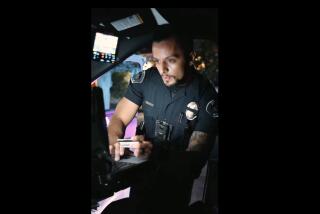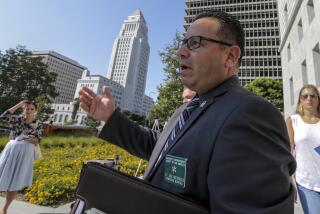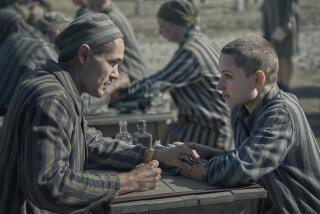Amid violent times, Iraqis turn to indelible IDs
- Share via
BAGHDAD — The ghastly procession of decapitated corpses and mutilated bodies that has defined death in Iraq drove Firas Adil Saadi to do something that was once the province of convicts and degenerates here: He got a tattoo.
The 28-year-old Shiite Muslim now has a marking on his right shoulder so his family may avoid the despair of not being able to identify his remains. In ornate Arabic calligraphy, it says “My brother Husam,” after a cousin who suffered such a fate. Saadi also carries paper identification, but he believes it would be burned beyond recognition in a bombing.
“The idea came to me after seeing these daily incidents during which some corpses are mutilated and distorted, some were even headless, and the fact that the identity cards are either lost or destroyed,” said Saadi, a trader who works in Baghdad’s Shorja market, which has suffered numerous bombings. “Even the water of the firefighting equipment is destroying them, so I thought about an irremovable identity card, which is the tattoo.”
Death trumps taboo
In Iraq, it has come to this: Faced with the omnipresent specter of death, an increasing number of people, mainly Shiite men, are willing to contravene social taboo to accommodate it.
Although tattoos are not exactly haram, or forbidden, under Shiite Islamic law, they are very much frowned upon in modern Iraq. There was a time here when men and women got tribal tattoos such as wrist markings or small dots on the chin as a sign of beauty or for spiritual reasons, such as warding off evil.
In the recent past, however, tattoos took on a different role: They were usually worn by men of the lowest classes and became a way to identify prisoners’ bodies in case they were tortured to death by guards. Repressed by Saddam Hussein, Shiites make up the bulk of the lower classes, which might explain why they’re more willing than Sunnis to get tattooed.
“I think the resort to using the tattoos by people now from all social classes is something like a return to barbarism, and this is exactly what the Americans want, getting Iraq to the pre-civilization times,” said Hashim Hassan, a Shiite professor at Baghdad University.
“Both the lower and middle classes are taking tattoo drawings on their bodies. It is more among the men than the women because of the feeling that the men are targeted so they do not want to lose the links with their families” even if they are killed, he said. “I think a time will come when each family will choose a tattoo for itself and get recognized by it.”
Iraq’s population of 27 million is less than that of California. By one estimate, 601,000 people have died violently since the U.S.-led invasion in 2003 -- the equivalent of losing the populations of both Long Beach and Thousand Oaks.
Iraq has long been a brutal, dangerous place, but the death rate has quadrupled since the invasion, and violence has become much more random than when Hussein’s regime targeted citizens for offenses real and imagined, large and small.
Though the level of violence has declined from last summer, Iraqis still live with a lack of personal security that is almost inconceivable anywhere else in the world. The simple act of going to a market, mosque or university is a life-risking enterprise. Still, they continue to live their lives, with small adjustments, such as the tattoos, in light of the risk.
For tattoo artists, it has become a lucrative business, albeit one conducted largely out of public view, in unmarked basements, in homes, or at shops that on the outside offer other services.
Artist Adil abu Salam, 45, an Iraqi who graduated from a fine arts college and did tattoo work in Lebanon, where it is more accepted, meets clients at a friend’s clothing store in the Shiite neighborhood of Karada. He returned to Iraq in 2004, after Hussein was toppled.
“In recent months, the number is getting more and more, Abu Salam said. “At the beginning, people were using it as a beautification. Now, they are asking for special symbols, signs, variegation and drawings. The number of people asking for tattoos is increased [because of] the bad security situation.”
Western influences
Of course, not all of the tattooing is out of purely mortal consideration. Possibly in response to Western influence, ranging from the presence of heavily inked Western security guards to images of tattooed American celebrities broadcast on satellite television, some Iraqis are getting work done for cosmetic reasons, with tough-guy designs such as scorpions or spiders. Teenage girls are sneaking in too, and Abu Salam is training a female artist to work on them, “especially in some places of the body,” he said.
But he and others believe concerns about being identifiable in death remain the primary reason for the surge in business. Abu Salam’s prices start at $30 -- a week’s salary for an average Iraqi -- but rise to as much as $150 for the deep engraving that customers ask for when they are considering it as an identification piece.
“I feel very sad and sorry that we are thinking in this way, thinking to be identified after our death,” said Saadi, the recently tattooed man. “But the methods of killing are barbaric in our country, and the targets are innocent people.”
christian.berthelsen@latimes.com
Times staff writers Raheem Salman and Zeena Kareem and a special correspondent contributed to this report.
More to Read
Sign up for Essential California
The most important California stories and recommendations in your inbox every morning.
You may occasionally receive promotional content from the Los Angeles Times.










